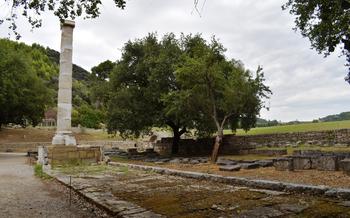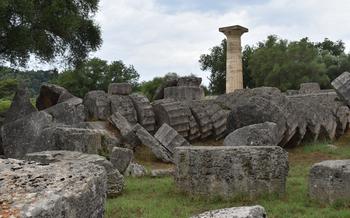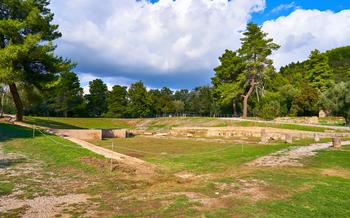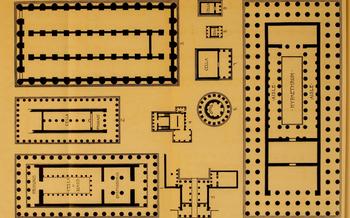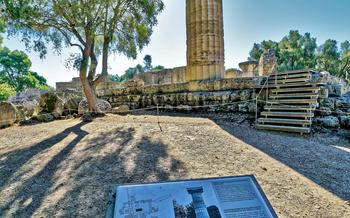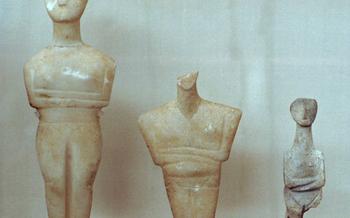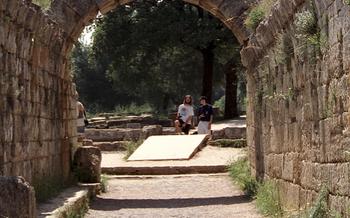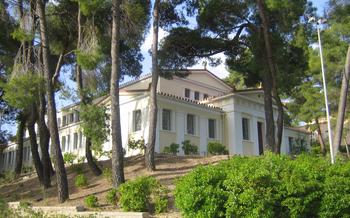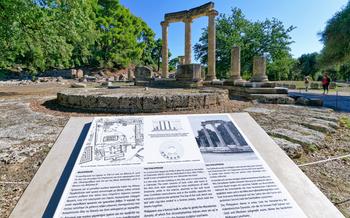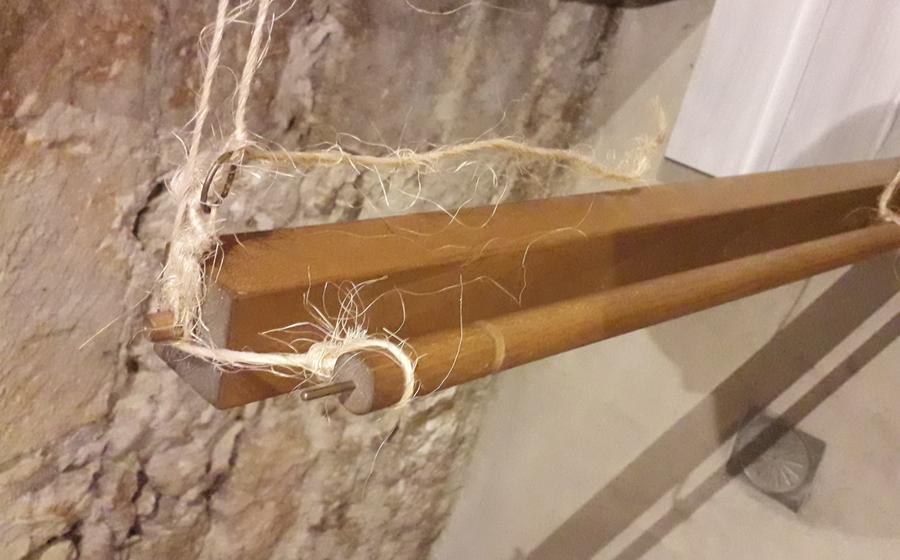
Museum of Ancient Greek Technology
- Olympia: A Journey Through History
- Museum of Ancient Greek Technology: A Treasure Trove of Innovation
- Exploring the Museum's Collections
- Unveiling Ancient Greek Engineering Marvels
- Medical Marvels of the Ancient Greeks
- Harnessing the Power of Nature
- Military Ingenuity and Defense Mechanisms
- Ancient Greek Mathematics and Astronomy
- Interactive Exhibits for a Hands-On Experience
- Guided Tours for In-Depth Insights
- A Walk Through History: Ancient Olympia Archaeological Site
- Combining History and Nature: Kladeos River and Foloi Forest
- Local Cuisine and Dining Experiences
- Insider Tip: Plan Your Visit
Olympia: A Journey Through History
Olympia, nestled in the Peloponnese region of Greece, is a place of profound historical significance. As the birthplace of the ancient Olympic Games, Olympia has played a pivotal role in shaping the cultural and sporting heritage of the world. The Olympic Games, held every four years, were a grand celebration of athleticism, unity, and peace among the ancient Greek city-states. Olympia's legacy extends beyond the games; it served as a center for religious worship, art, and intellectual pursuits. The region of Peloponnese itself is a treasure trove of ancient landmarks, including the ruins of Mycenae, Tiryns, and Epidaurus, offering a glimpse into the rich history and diverse cultures that flourished in ancient Greece.
Museum of Ancient Greek Technology: A Treasure Trove of Innovation
Housed in a modern building adjacent to the archaeological site of Olympia, the Museum of Ancient Greek Technology is a testament to the ingenuity and creativity of the ancient Greeks. Step inside, and you'll be transported back in time to an era where brilliant minds pushed the boundaries of innovation. The museum's collection features over 100 exhibits, including intricate replicas of ancient devices and machines, offering visitors a glimpse into the minds of the ancient Greek thinkers who shaped the course of human history.
Among the highlights of the museum's collection are the Antikythera Mechanism, an ancient analog computer used for calculating astronomical positions and eclipses, the Heron's Fountain, a device that utilizes the principles of air pressure and gravity to create a continuous flow of water, and the Archimedes Screw, a device used for raising water from a lower to a higher level. These exhibits, along with many others, showcase the remarkable achievements of the ancient Greeks in various fields, including engineering, mechanics, mathematics, and astronomy.
Exploring the Museum's Collections
The Museum of Ancient Greek Technology offers a diverse array of artifacts and replicas, inviting visitors to delve into the ingenious minds of ancient Greek inventors and engineers. From intricate mechanical devices to medical instruments and everyday tools, the museum's collections provide a comprehensive overview of ancient Greek advancements in various fields.
Interactive displays enhance the museum experience, allowing visitors to engage with the exhibits and gain a deeper understanding of how these ancient inventions functioned. Hands-on activities cater to visitors of all ages, providing an immersive and educational experience. Children and adults alike can replicate ancient Greek mechanisms, solve puzzles, and experiment with interactive models, making learning an exciting and memorable experience.
Unveiling Ancient Greek Engineering Marvels
The Museum of Ancient Greek Technology showcases the remarkable ingenuity of the ancient Greeks in the field of engineering. Among the highlights of the collection are water clocks and sundials, which demonstrate their expertise in timekeeping. These intricate devices allowed the Greeks to measure time accurately, enabling them to plan their daily lives and religious ceremonies precisely.
Another remarkable exhibit is the reconstruction of a crane, a machine used for lifting heavy objects during construction projects. This invention revolutionized the building process, allowing the Greeks to construct impressive structures like temples and theaters. The museum also features hoists, pulleys, and other mechanical devices that showcase the Greeks' understanding of simple machines and their application in everyday life.
The ancient Greeks also made significant contributions to the field of mechanics. The museum displays models of gears, levers, and other mechanisms that were used to transmit power and motion. These inventions laid the foundation for the development of more complex machines in later centuries.
Overall, the Museum of Ancient Greek Technology offers a fascinating glimpse into the engineering prowess of the ancient Greeks. Through its collection of artifacts and replicas, the museum sheds light on the innovative spirit that characterized this remarkable civilization and its lasting impact on the development of science and technology.
Medical Marvels of the Ancient Greeks
The Museum of Ancient Greek Technology in Olympia sheds light on the remarkable medical advancements made by the ancient Greeks. Visitors can marvel at a collection of surgical instruments and medical tools that showcase the ingenuity and skill of ancient Greek physicians. These tools, made from bronze, iron, and silver, include scalpels, forceps, probes, and saws, demonstrating the precision and sophistication of ancient Greek medicine.
The museum also highlights the ancient Greeks' understanding of anatomy and physiology. Hippocrates, known as the Father of Medicine, played a pivotal role in developing the field of medicine. His theories on the four humors and the importance of diet and lifestyle in maintaining health laid the foundation for modern medicine. The museum features interactive displays that allow visitors to explore Hippocrates' medical theories and their lasting impact.
One of the most fascinating exhibits in the medical section is a replica of an ancient Greek operating table. Visitors can learn about surgical procedures performed by ancient Greek physicians, such as amputations, cataract removal, and trepanation. The museum also showcases ancient Greek advancements in dentistry, including tools for extracting teeth and filling cavities.
Exploring the medical marvels of the ancient Greeks at the Museum of Ancient Greek Technology provides a glimpse into the origins of modern medicine. Visitors gain a deeper understanding of the remarkable contributions made by ancient Greek physicians and how their discoveries continue to shape the field of medicine today.
Harnessing the Power of Nature
The ancient Greeks were masters of utilizing natural resources to their advantage. Their ingenuity is evident in their development of waterwheels and windmills for energy generation. Waterwheels, powered by the flow of rivers or streams, were used to grind grain, pump water, and power other machinery. Windmills, on the other hand, harnessed the power of the wind to turn millstones and generate energy. These innovations revolutionized agriculture, enabling the Greeks to produce more food and increase their efficiency.
In addition to energy generation, the ancient Greeks also made significant advancements in water supply and irrigation. They constructed intricate systems of aqueducts to transport water from distant sources to cities and towns. These aqueducts not only provided a reliable supply of water for drinking and sanitation but also enabled the Greeks to irrigate their crops, leading to increased agricultural productivity. The ancient Greeks' understanding of hydraulics and water management allowed them to harness the power of nature and transform their environment.
Military Ingenuity and Defense Mechanisms
Ancient Greeks were not only skilled in the arts and sciences but also in the art of warfare. The museum showcases their military prowess through a collection of siege engines, defensive fortifications, ancient Greek warships, and naval technology. Visitors can marvel at the intricate design of catapults, ballistas, and siege towers, used to breach enemy defenses. Models of ancient Greek fortifications, such as city walls and towers, demonstrate their expertise in defensive architecture. The museum also highlights the naval prowess of the ancient Greeks, with exhibits on their advanced warships, equipped with multiple banks of oars for speed and maneuverability. These vessels played a crucial role in Greek victories in naval battles, such as the Battle of Salamis. The museum's exploration of ancient Greek military technology provides insights into their strategic thinking and engineering capabilities, which were essential for their success in defending their territories and expanding their influence.
Ancient Greek Mathematics and Astronomy
The ancient Greeks made significant contributions to mathematics and astronomy, and the Museum of Ancient Greek Technology showcases various tools and devices that demonstrate their ingenuity in these fields. Visitors can witness mathematical tools like the abacus and the Antikythera Mechanism, an ancient analog computer that could calculate the positions of the sun, moon, and planets. The museum also exhibits ancient Greek contributions to geometry and trigonometry, including the Pythagorean theorem and the use of the circle to measure angles. Additionally, the museum explores ancient Greek astronomical observations and theories, such as the geocentric model of the universe and the work of astronomers like Aristarchus of Samos, who first proposed the heliocentric model. These exhibits highlight the ancient Greeks' fascination with the natural world and their quest to understand the cosmos.
Interactive Exhibits for a Hands-On Experience
The Museum of Ancient Greek Technology takes a unique approach to learning, inviting visitors of all ages to engage with its exhibits through interactive displays and hands-on activities. Experience firsthand the ingenuity of ancient Greek inventors by replicating their inventions. Construct a water clock, operate a model crane, or even try out a replica of an ancient Greek calculator. These interactive experiences make the museum a dynamic and memorable destination, allowing visitors to gain a deeper understanding of ancient Greek technology. It's a fantastic way to learn about the past while having fun.
Guided Tours for In-Depth Insights
For a truly immersive and educational experience, consider booking a guided tour of the Museum of Ancient Greek Technology. Led by knowledgeable experts, these guided tours provide a comprehensive overview of the exhibits and their significance. You'll gain in-depth insights into the ancient Greek advancements and their impact on modern-day technology. The guides will share captivating stories and anecdotes, bringing the exhibits to life and shedding light on the ingenuity of the ancient Greek inventors. Whether you're a history buff, a science enthusiast, or simply curious about the ancient world, these guided tours offer a unique opportunity to delve into the marvels of ancient Greek technology.
A Walk Through History: Ancient Olympia Archaeological Site
After immersing yourself in the wonders of ancient Greek technology, take a step back in time and explore the ruins of ancient Olympia, a UNESCO World Heritage Site. Located just a short distance from the museum, this archaeological site is where the Olympic Games were held in ancient times. Feel the energy of the past as you walk through the ruins of the ancient stadium, where athletes from all over Greece competed for glory and honor. Visit the Temple of Zeus, once one of the largest and most magnificent temples in the ancient world, and admire its impressive columns and intricate sculptures. Stroll through the archaeological museum on-site to see a collection of artifacts unearthed from the site, providing further insights into the history and culture of ancient Olympia.
Combining History and Nature: Kladeos River and Foloi Forest
Complement your visit to the Museum of Ancient Greek Technology with a refreshing journey into nature. Take a leisurely stroll along the scenic banks of the Kladeos River, where you can admire the tranquil waters and lush greenery. Capture the idyllic landscapes as you wander along the river, embracing the serenity of the natural surroundings.
Venture into the enchanting Foloi Forest, a protected natural reserve renowned for its ecological significance. Explore the diverse flora and fauna, marveling at the ancient oak trees that have stood the test of time. Embark on a hiking trail, immersing yourself in the tranquility of nature's embrace.
As you explore the Kladeos River and Foloi Forest, you'll discover a harmonious blend of history and nature. Let the tranquility of these natural wonders soothe your mind and rejuvenate your spirit, creating a lasting memory of your journey to Olympia.
Local Cuisine and Dining Experiences
A trip to Olympia is not complete without savoring the local cuisine, which is renowned for its freshness, simplicity, and authentic flavors. Indulge in traditional Greek dishes prepared with locally sourced ingredients, such as fresh seafood, succulent meats, and an abundance of vegetables. Sample the famous Greek salad, moussaka, pastitsio, and souvlaki, all bursting with Mediterranean flavors.
Don't miss the opportunity to taste the region's exceptional olive oil, produced from centuries-old olive trees. Visit local olive groves and witness the traditional harvesting and pressing methods. Learn about the different varieties of olives and their unique flavors, and enjoy a tasting session to appreciate the nuances of each oil.
Pair your culinary journey with a visit to a local winery. The Peloponnese region is home to several wineries producing award-winning wines. Take a guided tour of the vineyards, learn about the winemaking process, and sample a variety of wines, from crisp whites to bold reds.
For a truly authentic experience, head to one of the traditional tavernas in Olympia. These charming establishments offer a warm and welcoming atmosphere, where you can mingle with locals and enjoy delicious home-cooked meals. Savor the flavors of Greece as you dine al fresco, surrounded by the vibrant energy of the town.
Insider Tip: Plan Your Visit
To make the most of your visit to the Museum of Ancient Greek Technology, it's essential to plan ahead.
